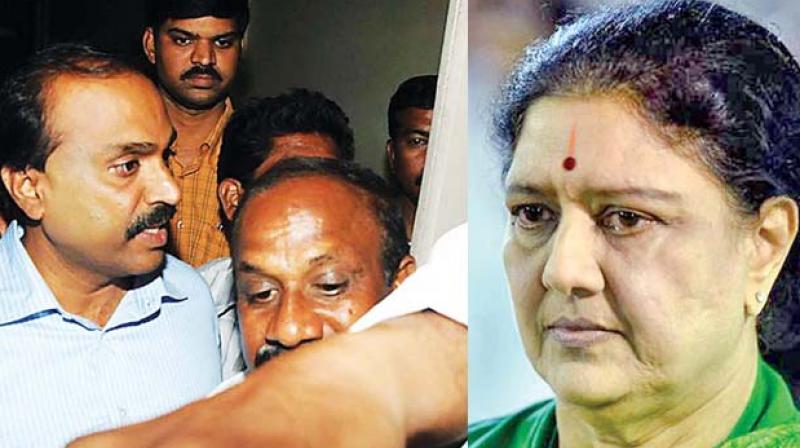Namma Chennai diary: Society's soul defiled, devalued and denigrated

The wittiest thing being said about the Parapappana Agrahara jail episodes is about Sasikala being a magician as she is “a person who can transform a resort into a jail and a prison into a resort”. The reports coming out of the notorious central prison in Bengaluru are indeed illustrative of how much we have progressed as a society. The rich will always flash their cash in any situation and it matters little if they are old rich, nouveau riche or just simply filthy rich on public money. Are they to blame if the system goes for a toss at the mere sight of a few notes.
Sasikala is not the first VVIP prisoner to buy herself comforts in jail even if her acts do seem a bit excessive when you can manipulate five cells into one exclusive block, get designer clothes into prison for visiting hours and have a personal cook look after your culinary concerns. Poes Garden cooks are not new to jail. They were always thought to reside nearby and go to a special kitchen corner in prison to do their duty by the stove. The tales that come out of this particular jail could fill several pages of novels on the ne-therworld behind the iron gates.
A mining baron was said to have commandeered a whole block for himself while at the Agrahara. Now, he was a real VVVIP prisoner as he was from Karnataka and had been an influential minister to boot. All three Reddy brothers were to be inmates after the mining scandal broke and the facilities they enjoyed are said to be ‘five star’ by jail standards. Earlier, they were known to have been so dominant outside as to have run the ‘Republic of Bellary’ with an iron hand, pun intended, when the mining contracts were theirs.
In more recent times, there was a business baron who was allowed by the court to conduct the business of selling his properties while in jail. A separate office space was created for him so that he could try to fulfil Supreme Court orders to liquidate assets and settle Sebi conditions that he de-posit the monies illegally obtained and banked as ‘de-posits’ from the public. Tihar, notorious even long af-ter Kiran Bedi tried to clean the Augean stables, was agog at the goings-on with the baron's business and top court diktats that governed them.
The world of the highest privileges is, however, is that of the politicians. Take Lalu for instance. He was convicted for graft in 2013 and is out on bail and cannot stand in an election till 2024. And yet the same man could, till yesterday, drive his car on to the tarmac and up to the airplane in Patna before hopping on to the flight. This privilege was also his wife's, but then she is also a former Chief Min-ister of Bihar. The beauty of it all is politicians get security threats about themselves written up so imaginatively that they are eligible for privileges wherever th-ey go.
The privileges granted to those who can bribe prison officials make a mockery of the system. Now, a person is sent to prison because he / she has flouted laws that are supposed to keep the fabric of a free society stitched together. If a prisoner is able to command perquisites and serve out a term with all comforts he / she cocks a snook at the judiciary, which has done its duty diligently in sending the person to prison. What happens in Sasikala's case to the pearls of wisdom of Pinaki Chandra Ghose, who demolished quite brilliantly all the arguments put forth to get away with what was just pure and simple graft?
There must be a judicial angle to these episodes portraying the dodging of the intention behind sending a person to prison. The remit of the judges should not stop with just the final order of imprisonment. If the executive runs such a sham exercise of a rate card of cash for comforts in jail, then surely the judiciary must take this up suo moto, or someone should bring it to the attention of the top court that sentenced the likes of Sasikala and her kin.
Ghose may have retired but there must be many fearless judges like him on the bench capable of declaring that the privileges enjoyed were the equivalent of challenging the orders of the Supreme Court. Now read a part of his famous judgment which said, “This pernicious menace stemming from moral debasement of the culpables, apart from destroying the sinews of the nation's structural and moral set-up, forges an unfair advantage of the dishonest over the principled, widening as well the divide between the haves and have nots. Not only this has a demoralising bearing on those who are ethical, honest, upright and enterprising, it is visibly antithetical to the quintessential spirit of the fundamental duty of every citizen to strive towa-rds excellence in all spheres of individual and collective activity to raise the nation to higher levels of endeavour and achievement. This virulent affliction triggers an imbalance in the society's existential stratas and stalls constructive progress in the overall well-being of the nation, besides disrupting its dynamics of fiscal governance. It encourages defiance of the rule of law and the propensities for easy materialistic harvests, whereby the society's soul stands defiled, devalued and denigrated.”The case rests not only on the greedily corrupt but also on the corruption that they perpetuate.

